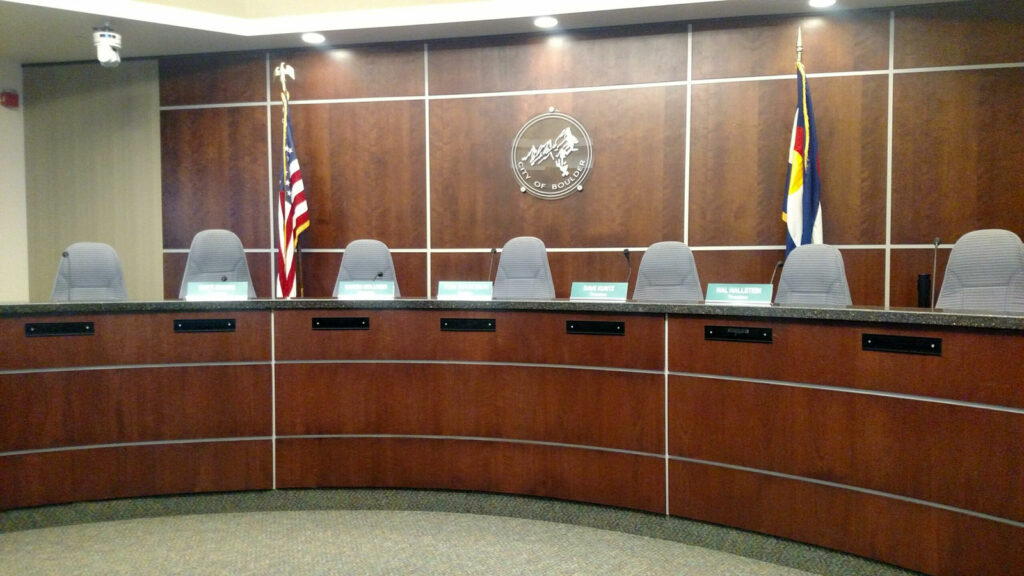Thursday, Oct. 15, 2020
Recent profanity-laden testimony from members of the public sparked debate this week among Boulder’s elected officials about what language is acceptable during city council meetings and how much, if at all, the government should attempt to influence residents’ speech during official proceedings.
Several speakers swore during the Oct. 6 open comment and public hearings. Some of the cursing was directed toward City Manager Jane Brautigam in criticism of the city’s handling of unhoused residents.
Council members were in agreement Tuesday that personal attacks on staff are unacceptable.
“I don’t think working for the city of Boulder should mean you are chronically subjected to verbal or emotional abuse,” said Rachel Friend. “I don’t think that should be part of the job. We have lost staff members and chased staff members away — I’ve certainly seen it on the CU South project — from not protecting them.”
Read a Twitter thread of Tuesday night’s discussion
Such rebukes of the public when it comes to staff are common. Controversial issues frequently draw accusations of staff incompetence, dishonesty or intentional manipulation of information. The Tipton Report, released last year, found that planning and public works employees felt council “don’t have our backs” when it comes to public pushback on their projects.
City Attorney Tom Carr said he and Jane Brautigam, Boulder’s senior staff, are “used to” harsh criticism. But he worries about lower-level staff who infrequently attend council meetings.
“Coming to you should be the highlight of their year, and often it’s something they’re very afraid of doing,” Carr said.
While Brautigam said staff “can take” residents using “naughty language … dirty words” and “epithets,” repeated demonization does “weigh heavy on you as a person.”
“It’s fine to criticize the work that we do,” she said, “but not us as people.”
Mayor Sam Weaver, who leads most meetings, says he typically tries to “pipe up” following testimony that includes either vulgarity or disparagement of staff, reminding speakers of the rules of decorum without directly calling out the previous speaker — or interrupting them.
“I don’t think in a council meeting it’s appropriate to cut someone off, even if they’re abusing staff,” Weaver said.
Other council members disagreed.
“Our staff should not be treated as piñatas,” said Mark Wallach. “It doesn’t mean you can’t express yourself with passion. It doesn’t mean you can’t be critical. But when it gets to a very, very deeply personal level, I don’t think this is simply a situation where you let it ride and hopes the next person does better.”
Bob Yates, who led the Oct. 6 meeting in Weaver’s absence, said he spent some time during that meeting researching legal means of curbing speakers.
Following the contentious open commentDedicated time at the beginning of regular council meetings, where up to 20 members of the public ca... period, “I was actually reading very quickly our rules of decorum online trying to find grounds to restrict some of the things that were said for fear they might come up in public hearingScheduled time allocated for the public to testify or share commentary/input on a particular ordinan...,” Yates said Tuesday. “I couldn’t find those things … that would have allowed me as the meeting facilitator to have cut those people off.”
It’s a thin line for a government to walk, given Americans’ broad freedoms of speech under the First AmendmentChange made to existing documents, resolutions, or ordinances. The city has run afoul of those rights before, a decade ago, when a resident stripped down to his underwear
at the podium in protest of a public nudity ordinanceA piece of municipal (city-level) legislation. that spelled the end of Boulder’s Naked Pumpkin Run and Naked Bike Ride.
Seth Brigham was arrested — after he made personal comments about individual council members’ business and campaign dealings — and escorted from council chambers. Boulder ended up dropping the charges and shelling out $10,000 to avoid a lawsuit.
Yates suggested that council re-examine its rules for public testimony, to find how officials might “regulate time, place and manner” of commentary. Mary Young concurred; being overly permissive with even one resident’s speech sets a tone that encourages angry or hateful rhetoric from subsequent speakers.
“Whatever we can do to draw a line toward more cooperative language … I would be in favor of that,” she said.
Friend and Yates, who seat the subcommittee on engagement, pled for council to look inward as well in its quest for better behavior.
“We should do some reflection on why it is some people in our community feel the only way they can communicate is through that very challenging language,” Yates said. “If you have someone expressing themselves in those desperate terms, I think you need to consider the fact there may be some powerlessness that person feels.”
That includes looking at who gets council’s attention through more standard means, Friend said.
“I would really encourage us to dig deep and think, Do we return calls with equity? Do we return emails with equity? Are we giving the community equal opportunity chances to engage so they don’t have to, like, you know, wind up to appear on Tuesday nights wanting to explode because they feel they can’t be heard?
“Not just feel like they can’t. Sometimes they can’t be heard.”
— Shay Castle, boulderbeatnews@gmail.com, @shayshinecastle
Want more stories like this, delivered straight to your inbox? Click here to sign up for a weekly newsletter from Boulder Beat.
Uncategorized Bob Yates Boulder city council engagement Jane Brautigam Mark Wallach Mary Young Naked Bike Ride Naked Pumpkin Run open comment participation public hearing public testimony Rachel Friend Sam Weaver Seth Brigham Tom Carr

